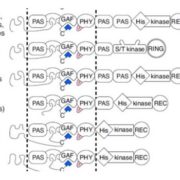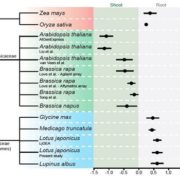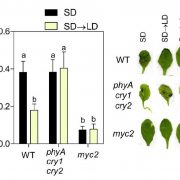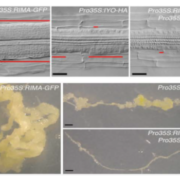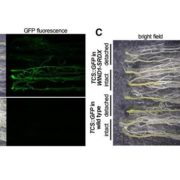Mechanistic basis for the activation of membrane receptor kinases by SERK-family coreceptors (PNAS)
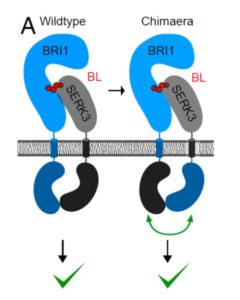 LRR-RKs (Leucine-Rich Repeat Receptor Kinases) are membrane-spanning receptor molecules that recognize a diverse array of signaling ligands. SERKs (SOMATIC EMBRYOGENESIS RECEPTOR KINASEs) are co-receptors that are required for signal processing. Like LRR-RKs, SERKs span the membrane, with an intracellular kinase domain and an external LRR ectodomain, but the SERK ectodomain is smaller than that of LRR-RKs. Hohmann et al. explored the interaction between the ligands and the LRR-RK – SERK co-receptor pair. They found that there are two distinct interaction sites in the ectodomains and that these domains differently affect ligand sensing, complex formation,
LRR-RKs (Leucine-Rich Repeat Receptor Kinases) are membrane-spanning receptor molecules that recognize a diverse array of signaling ligands. SERKs (SOMATIC EMBRYOGENESIS RECEPTOR KINASEs) are co-receptors that are required for signal processing. Like LRR-RKs, SERKs span the membrane, with an intracellular kinase domain and an external LRR ectodomain, but the SERK ectodomain is smaller than that of LRR-RKs. Hohmann et al. explored the interaction between the ligands and the LRR-RK – SERK co-receptor pair. They found that there are two distinct interaction sites in the ectodomains and that these domains differently affect ligand sensing, complex formation,
and complex stability. One key finding is the suggestion that the main function of the SERK co-receptor may be to slow the dissociation of the ligand from the LRR-RK protein. The authors further speculate that SERKs may have evolved “as adapter proteins that allow LRR-RKs to transduce information across membranes without the need for major conformation rearrangements“. (Summary by Mary Williams) PNAS


